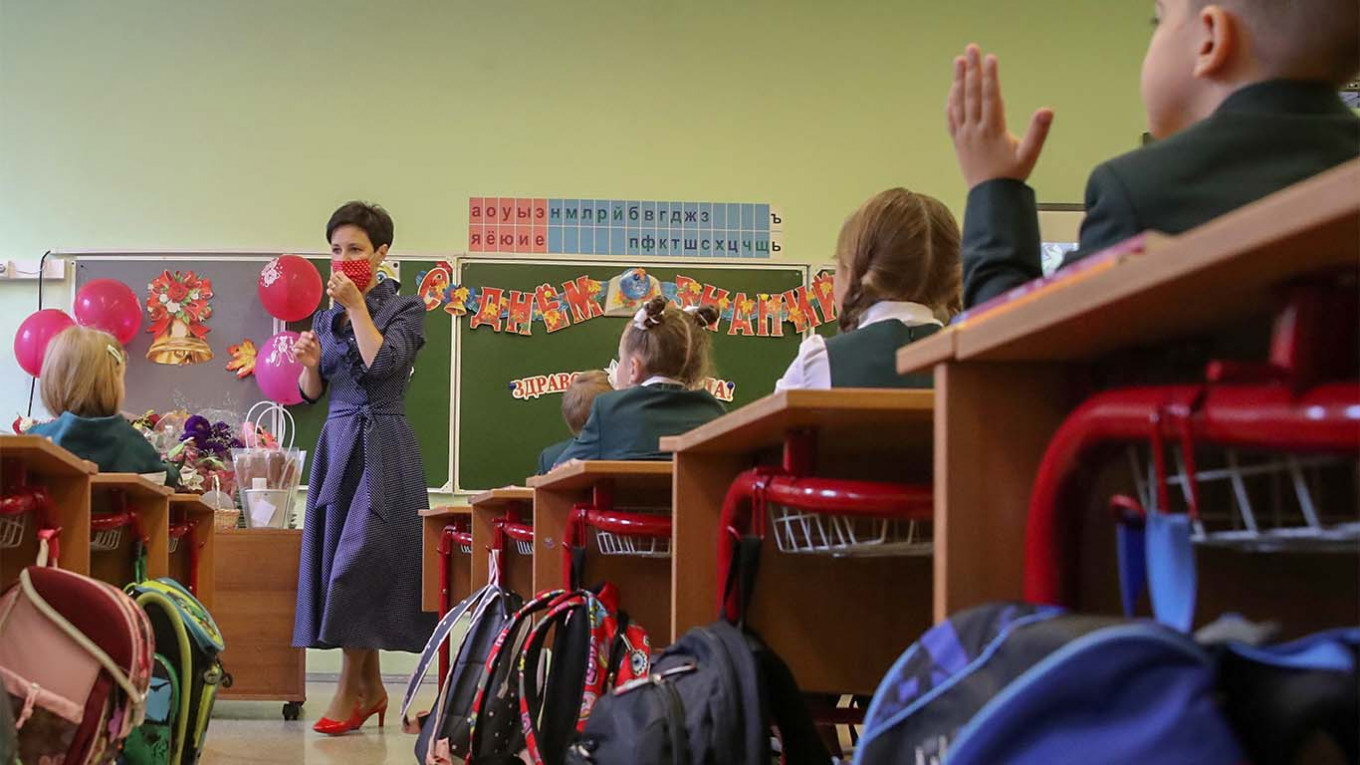
Students across Russia are heading back to school Tuesday for the first time since the start of the coronavirus pandemic.
It’s an uneasy Den Znanii, or Day of Knowledge as Sept. 1 is known in Russia, as the country continues to register nearly 5,000 new coronavirus cases per day, and doctors have sounded the alarm that reopening schools could lead to an “explosion” of the virus.
“All [coronavirus safety] requirements will be taken into account in order to protect our children and teachers as much as possible,” Education Minister Sergei Kravtsov said last month when announcing plans for schools to reopen.
In preparation for the reopening of schools, Moscow city authorities ran coronavirus tests on all 180,000 employees of the capital’s education system, including teachers, canteen workers, cleaners and other staff. Some 3% — or 5,500 — tested positive and will be temporarily kept away from schools, while another 13.3% were found to have antibodies.
A set of guidelines sent to Russia’s regions by the Education Ministry and consumer protection watchdog Rospotrebnadzor says nothing about requiring teachers or students to wear face masks, but orders schools to provide hand sanitizer and install air disinfecting machines.
According to the guidelines, students should have their temperatures taken at the entrance to school each day. If a student’s temperature is above 37.1 degrees Celsius, they must be isolated until a parent or an ambulance can pick them up.
Each class will also be assigned a designated classroom that only its students will use, the guidelines say. Classes will only switch rooms for art and science classes as they require special equipment. Students should be spaced at least 2.5 square meters apart, and the guidelines also recommend staggering breaks so large numbers of students don’t gather in hallways at one time.
Schools should be cleaned daily with disinfectant in addition to a more thorough weekly cleaning, the guidelines say. Mass events involving multiple classes remain prohibited.
Switching to remote learning will be considered “if the epidemiological situation worsens,” the guidelines say. During the height of Russia’s coronavirus outbreak in the spring, schools nationwide closed and switched to online learning, which posed a major challenge to students living in parts of the country that lack adequate technology infrastructure.
Parents are trying to balance the risk to health with the desire to return to normal life.
“I think there are risks, but not more than for those who commute to work in the metro, for example,” Natalia Burlinova, whose daughter will attend a public kindergarten in Moscow, told The Moscow Times.
Many schools have started fundraising to purchase air disinfecting machines for their classrooms, BBC Russia has reported. In the city of Chelyabinsk, several teachers reportedly quit after they were forced to ask parents to donate money toward the equipment.
Schools have also raised questions about the Education Ministry and Rospotrebnadzor’s spacing guidelines, arguing that they won’t have enough space in their classrooms to accommodate all students.
Teachers and healthcare workers will be first to be offered Russia’s highly touted Sputnik V vaccine while it continues to undergo clinical trials this month. The Health Ministry has said that vaccinations will be voluntary.
For now, though, parents and students are embracing Den Znanii 2020.
“People talk about a second wave, but everyone hopes that there will be no new quarantine. People have gotten used to the idea that the coronavirus is near and can touch you, but life continues, you have to earn a living and children have to go to school and get an education,” said Burlinova.
Jake Cordell contributed reporting.
